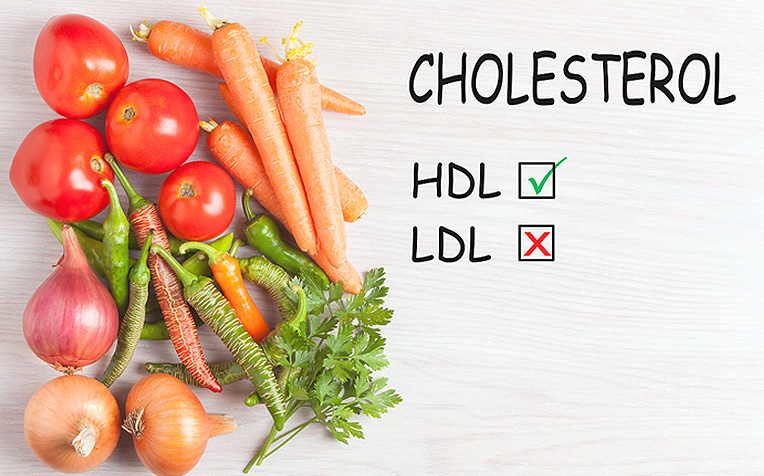
“Keeping your cholesterol level in check is important as high cholesterol contributes to atherosclerosis (build-up of plaque in the arteries), which increases risk of
heart disease and
stroke,” explains dietitians from
Dietetic & Food Services at
Changi General Hospital (CGH), a member of the
SingHealth group.
Effective ways to control your cholesterol include:
- Adopting a healthy balanced diet
- Leading an active lifestyle
- Taking medication (if prescribed by your doctor)
Read more:
Stroke - Top 10 doctor-recommended tips to reduce your risk
 What to eat: Fibre and unsaturated fats
What to eat: Fibre and unsaturated fats
Fibre helps to reduce total cholesterol and LDL-cholesterol, by excreting cholesterol through faeces. Good sources of fibre include:
Fruits
Vegetables
Wholegrains like brown rice
Wholemeal bread and chapatti
Oats and barley (rich sources of soluble fibre)
How much fibre to eat daily
In order to achieve sufficient fibre intake, it is recommended to consume:
2 servings of fruit (1 serving of fresh fruit is the size of your fist)
2 servings of vegetables (1 serving of cooked vegetables is the amount that fills ¾ cup)
2 to 3 servings of wholegrains
Examples of 1 serving of wholegrains include:
½ bowl of brown / red / unpolished rice or
½ bowl of brown rice beehoon / whole-wheat spaghetti or
2 slices of wholemeal / multigrain bread or
2/3 bowl of raw oats or
2 chapattis
“For easy remembering, the
My Healthy Plate is a useful tool that helps you to plan your meals. Fill ¼ of your plate with wholegrains, ¼ of your plate with lean protein, and ½ of your plate with vegetables and fruit,” advises CGH dietitians.
Read more:
Top exercises to lower bad cholesterol (and increase the good)
Unsaturated fats (monounsaturated and polyunsaturated) when eaten as a replacement for saturated fats, can help to lower LDL-cholesterol.
Foods rich in unsaturated fats include:
Nuts and seeds
Avocado
Healthier cooking oils like canola, sunflower, olive, corn, peanut, soybean, sesame
Oily fishes like salmon, cod, saba, sardine, tuna and mackerel
“Oily fishes are rich in omega-3, a type of polyunsaturated fat, which has better potential to reduce LDL-cholesterol. Health Promotion Board (HPB) recommends consumption of fish, particularly oily fish, at least twice a week as part of a heart healthy diet. One serving of fish is equivalent to the size of a palm,” CGH dietitians add.
 What to avoid: Saturated fat and trans fat
What to avoid: Saturated fat and trans fat
Saturated fat consumption leads to increased LDL-cholesterol (or “bad cholesterol”). If you already have high cholesterol, it is beneficial to reduce saturated fat intake, which mainly comes from:
Animal fats (skin and fats of meat / poultry, lard, ghee, butter, full cream dairy products)
Palm oil
Cocoa butter
Coconut oil and coconut milk
Consumption of
trans fat also leads to both increased LDL-cholesterol and reduction of HDL-cholesterol (the “good” cholesterol). Thus, it is important to consume minimal trans fat in your diet. Foods high in trans fats include:
Fried food
Baked goods
Also, look out for “partially hydrogenated vegetable oil” in the ingredients list of packaged goods as this indicates that the product contains added trans fats.
Examples include french fries, potato chips, pastries and cookies.
How long does it take for cholesterol to improve with diet changes?
“It may take a few weeks to months for a healthy diet to help with improving cholesterol, but when coupled with sufficient exercise, you will be able to see results sooner,” advises CGH dietitians.
Do remember that this is not a special diet regimen. A varied and well-balanced diet not only helps improve cholesterol, but is also beneficial for overall health and reducing risk of developing chronic diseases.
It is recommended for everyone to adopt such principles when planning your meals, as part of your everyday healthy lifestyle.
Read more:
Cholesterol tips for eating out and grocery shopping
--
Articles on
HealthXchange.sg are meant for informational purposes only and cannot replace professional surgical, medical or health advice, examination, diagnosis or treatment. Photo courtesy of iStock.